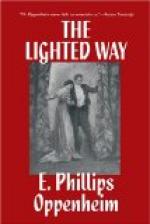He could not finish his sentence. She raised her eyes and he saw that they were full of tears.
“Help me,” he begged. “You can if you will. Give me your confidence and I will tell you something which I think that even you do not know.”
“Something concerned with these happenings?”
“Something concerned with them,” he assented. “I will tell you when and by whom the body of that man was removed from your sitting-room.”
She sat looking at him like a woman turned to stone. There was incredulity in her eyes, incredulity and horror.
“You cannot know that!” she faltered.
“I do know it,” he asserted.
“Why have you kept this a secret from me?” she asked.
“I do not know,” he answered. “Somehow or other, when I have been with you I have felt more anxious to talk of other things. Then there was another reason which made me anxious to forget the whole affair if I could. I had some knowledge of one of the men who were concerned in taking him away.”
The waiter was busy now with the removal of their luncheon. To Arnold, the necessary exchange of commonplaces was an immense relief. It was several minutes before they were alone again. Then she leaned across towards him. She had lit a cigarette now, and, although she was very thoughtful, she seemed more at her ease.
“Listen,” she began. “I do not ask you to tell me anything more about that night—I do not wish to hear anything. Tell me instead exactly what it is that you want from me!”
“I want nothing more nor less,” he answered gently, “than permission to be your friend and to possess a little more of your confidence. I want you to end this mystery which surrounds the things of which I have spoken.”
“And supposing,” she said thoughtfully, “supposing I find that my obligations to other people forbid me to discuss these matters any more with you?”
“I can only hope,” he answered, “that you will not feel like that. Remember that these things must have some bearing upon the disappearance of Mr. Weatherley.”
She rose to her feet with a little shrug of the shoulders and walked up and down the room for several moments, smoking and humming a light tune to herself. Arnold watched her, struggling all the time against the reluctant admiration with which she always inspired him. She seemed to read in his eyes what was passing in his mind, for when at last she came to a standstill she stood by his side and laughed at him, with faintly upraised eyebrows, the cigarette smoke curling from her lips.
“And it was for a luncheon such as this,” she protested, “that I wore my new muslin gown and came all the way from the country. I expected compliments at least. Perhaps I even hoped,” she whispered, leaning a little towards him, with a smile upon her lips,—half mirthful, half provocative,—“that I might have turned for a moment that wonderfully hard head of yours.”




